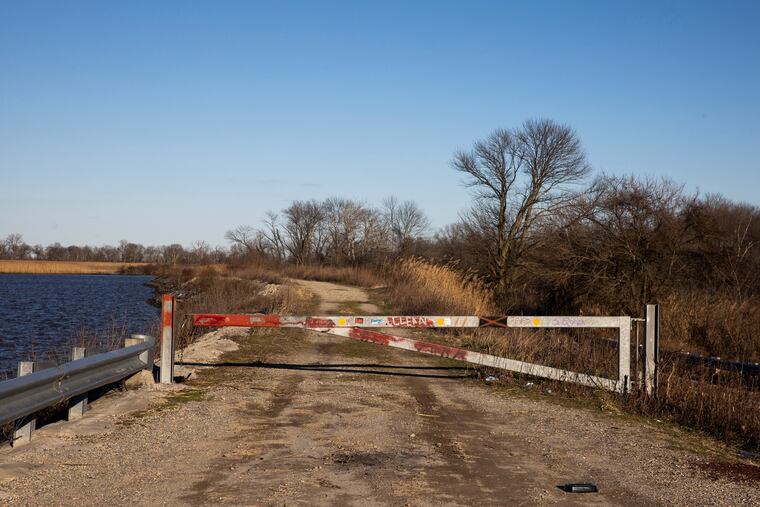New Jersey and Puerto Rico are joined in the fight against unsafe natural gas terminals | Opinion
Construction has been on hold for a Gibbstown gas terminal until Sept. 15 and should be canceled permanently.

Two sides of the same environmental justice fight are playing out in New Jersey and Puerto Rico, as plans to build gas export and import facilities harmful to local communities undermine our urgent climate goals and threaten to unleash massive new sources of pollution.
In both places, there has been a welcome shift to green energy. In 2019, the Puerto Rican government announced a 100% renewable energy mandate by 2050 while New Jersey has seen a massive expansion of the offshore wind industry. But in both places, climate activists are fighting the same fossil fuel company: New Fortress Energy, which owns a liquefied natural gas (LNG) import terminal in the Port of San Juan, and is proposing to build a massive new fracked gas export terminal in Gibbstown, N.J.
» READ MORE: Plan to send LNG trains through Philly to S. Jersey port sparks outrage from residents, environmentalists
If New Fortress gets its way in South Jersey, gas would be liquefied at a facility in Wyalusing, Pa., and then moved by train or truck traffic to the Gibbstown dock on the Delaware River — endangering cities and towns along the way.
Transporting LNG by road or rail is extremely hazardous. Nicknamed “bomb trains,” just one rail car could destroy a community. EarthJustice reports that a train of 110 tank cars filled with liquefied natural gas would have five times the energy of the Hiroshima bomb — and New Fortress has planned to send several 100-car trains of LNG a day from Wyalusing to Gibbstown.
These bomb trains and trucks will pass through densely populated communities, spewing harmful pollution into majority Black and brown neighborhoods, and impoverished areas, already exposed to higher levels of damaging particulate matter, such as Camden and Chester. The facility itself in Gibbstown would be built less than two miles away from a day-care center, public parks and athletic fields, and a school.
Though the scheme is opposed by environmentalists, health professionals, community groups, and concerned residents, it was quickly approved by the Delaware River Basin Commission. Its approval is, thankfully, not the final word. But New Fortress has taken steps that evade scrutiny from the federal agency tasked with reviewing new fossil fuel infrastructure projects.
Just as it did with a facility in Puerto Rico, New Fortress has argued that the Gibbstown terminal is not technically an LNG terminal as defined under the Natural Gas Act. Therefore, the Federal Energy Regulatory Commission (FERC) — an independent agency that regulates interstate transmission of electricity, gas, and oil, and permits new gas pipelines and export facilities — would not have jurisdiction over the facility. This approach allows terminals to evade federal review.
But in March, FERC ruled New Fortress did not prove that its gas import terminal in Puerto Rico was exempt from the agency’s jurisdiction under the Natural Gas Act.
Next up for FERC should be a similar decision on Gibbstown — specifically, the company must show an actual need for the Gibbstown facility. The commission must also evaluate the safety and environmental justice impacts.
When it comes to climate impacts of new fossil fuel projects, we already know the score. If the world is to hit net-zero emissions targets by 2050, as stated by the International Energy Agency in May, many planned and under construction LNG liquefaction facilities should not be built.
» READ MORE: Wrong place, wrong time for LNG terminal | Editorial
Similarly, the new Intergovernmental Panel on Climate Change report highlights the dangers of growing methane emissions in the atmosphere, which are commonplace throughout the gas production transportation life cycle.
There is growing momentum against new LNG schemes. FERC’s decision to assert its authority over the Caribbean facility is bad news for New Fortress. Similarly, an Irish court halted its plans to send LNG to Ireland. With more import facilities coming under scrutiny, it’s clear fewer and fewer people want to buy into these terminals.
Neither the logistics center nor the export facility is a done deal. Construction has been on hold until Wednesday earliest, and the project needs permits from New Jersey Gov. Phil Murphy’s Department of Environmental Protection. The climate injustice is clear, and the need isn’t there. It’s past time FERC and President Joe Biden shut down the terminals — in San Juan and Gibbstown.
Fermin Morales is a community organizer with Philly Boricuas. Marcus Sibley is the New Jersey State Conference NAACP environmental and climate justice chairman and president of the Southern Burlington County New Jersey NAACP.